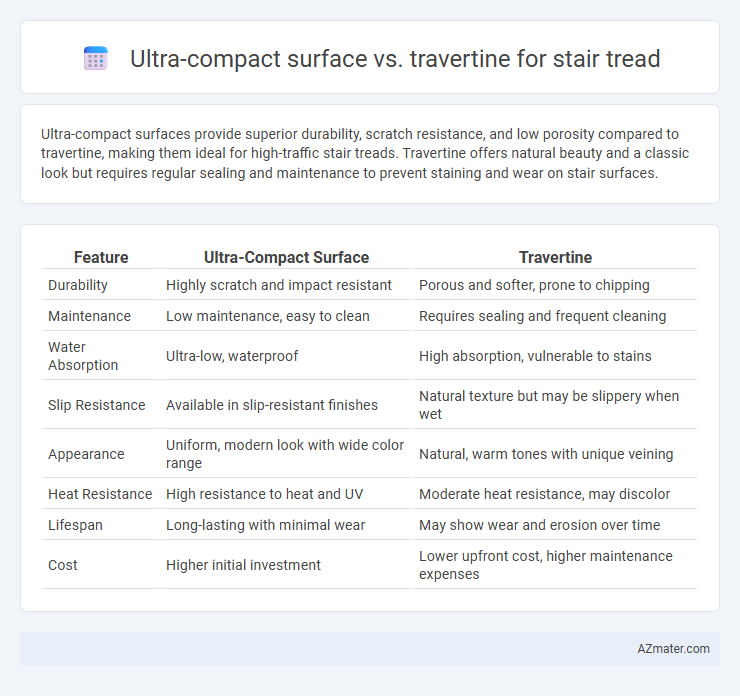Ultra-compact surfaces provide superior durability, scratch resistance, and low porosity compared to travertine, making them ideal for high-traffic stair treads. Travertine offers natural beauty and a classic look but requires regular sealing and maintenance to prevent staining and wear on stair surfaces.
Table of Comparison
| Feature | Ultra-Compact Surface | Travertine |
|---|---|---|
| Durability | Highly scratch and impact resistant | Porous and softer, prone to chipping |
| Maintenance | Low maintenance, easy to clean | Requires sealing and frequent cleaning |
| Water Absorption | Ultra-low, waterproof | High absorption, vulnerable to stains |
| Slip Resistance | Available in slip-resistant finishes | Natural texture but may be slippery when wet |
| Appearance | Uniform, modern look with wide color range | Natural, warm tones with unique veining |
| Heat Resistance | High resistance to heat and UV | Moderate heat resistance, may discolor |
| Lifespan | Long-lasting with minimal wear | May show wear and erosion over time |
| Cost | Higher initial investment | Lower upfront cost, higher maintenance expenses |
Understanding Ultra-Compact Surfaces for Stair Treads
Ultra-compact surfaces offer exceptional durability and resistance to scratches, stains, and heat, making them ideal for high-traffic stair treads compared to travertine, which is more porous and prone to wear. These engineered materials provide consistent thickness and uniform appearance, allowing precise fabrication and easy installation on stairs. Their low maintenance requirements and wide range of colors and textures make ultra-compact surfaces a practical and aesthetic choice for modern stair designs.
Key Characteristics of Travertine as a Stair Material
Travertine is a natural stone known for its durability, slip resistance, and unique porous texture, making it a popular choice for stair treads in both indoor and outdoor settings. Its ability to withstand heavy foot traffic while maintaining aesthetic appeal is enhanced by its warm earth tones and natural veining, providing a timeless and elegant look. Compared to ultra-compact surfaces, travertine offers a more organic appearance with excellent thermal properties, but requires sealing to prevent staining and maintain its structural integrity over time.
Durability Comparison: Ultra-Compact Surface vs Travertine
Ultra-compact surfaces exhibit superior durability compared to travertine for stair treads due to their enhanced resistance to scratches, stains, and impact. Unlike travertine, which is a natural stone prone to surface erosion and chipping over time, ultra-compact materials maintain their structural integrity and appearance with minimal maintenance. Their non-porous composition also prevents moisture absorption, making them ideal for high-traffic staircases requiring long-lasting performance.
Aesthetic Appeal: Matching Materials to Staircase Design
Ultra-compact surfaces offer a sleek, modern aesthetic with uniform textures and a vast color palette that complements contemporary staircase designs, enhancing visual continuity. Travertine provides a natural, warm appeal with distinctive veining and earthy tones, ideal for classical and rustic staircases seeking timeless elegance. Selecting between ultra-compact surfaces and travertine depends on desired style cohesion, maintenance preferences, and the architectural context of the space.
Slip Resistance and Safety Considerations
Ultra-compact surfaces offer superior slip resistance for stair treads due to their high density and non-porous composition, reducing the risk of accidents in both wet and dry conditions. Travertine, a natural stone, tends to be more porous and can become slippery when polished or wet, necessitating additional treatments or textured finishes for enhanced safety. Prioritizing materials with inherent slip-resistant properties, such as ultra-compact surfaces, is crucial for optimal stair tread safety and long-term durability.
Maintenance Requirements: Ease of Cleaning and Upkeep
Ultra-compact surfaces require minimal maintenance for stair treads due to their non-porous nature, resisting stains and preventing moisture absorption, which simplifies cleaning with just mild detergents and water. Travertine, a natural stone, demands regular sealing to protect against stains and moisture, and is prone to damage from acidic cleaners, making upkeep more intensive and requiring specialized cleaning products. Choosing ultra-compact surfaces reduces long-term maintenance efforts and costs compared to the higher upkeep demands of travertine stair treads.
Weather and Moisture Resistance: Outdoor Stair Tread Suitability
Ultra-compact surfaces exhibit superior weather and moisture resistance compared to travertine, making them ideal for outdoor stair treads exposed to fluctuating temperatures and heavy rainfall. Their non-porous structure prevents water absorption, reducing risks of cracking, staining, and frost damage. Travertine's natural porous composition requires sealing to enhance durability, but even with treatment, it remains less resilient against prolonged moisture exposure in outdoor stair applications.
Installation Process: Ultra-Compact Surface vs Travertine
Ultra-compact surfaces offer a streamlined installation process for stair treads due to their lightweight and uniform thickness, allowing for precise cuts and minimal labor time. Travertine, being a natural stone, requires more careful handling and expertise during installation to accommodate its variable thickness and porous nature, increasing the complexity and duration of the project. The adhesive and sealing process for travertine is more intensive compared to the simpler bonding techniques used for ultra-compact surfaces, directly impacting overall installation efficiency.
Cost Analysis and Long-Term Value
Ultra-compact surfaces typically cost between $50 and $100 per square foot, offering high durability and resistance to stains, scratches, and heat, which reduces maintenance expenses over time. Travertine stair treads generally range from $30 to $60 per square foot, with higher initial costs for sealing and ongoing maintenance to prevent damage and staining. Considering long-term value, ultra-compact surfaces provide superior longevity and minimal upkeep, resulting in a lower total cost of ownership compared to travertine, which may require periodic repairs and refinishing.
Sustainability and Environmental Impact of Each Material
Ultra-compact surfaces, composed of natural raw materials like quartz and porcelain, offer exceptional durability and low maintenance, reducing the need for frequent replacements and minimizing environmental waste. Travertine, a natural stone, involves quarrying processes that can significantly alter landscapes and consume more energy, yet it remains biodegradable and sustainably sourced when harvested responsibly. Choosing ultra-compact surfaces generally results in a lower carbon footprint and enhanced resource efficiency compared to travertine, aligning better with sustainable building practices.

Infographic: Ultra-compact surface vs Travertine for Stair tread
 azmater.com
azmater.com